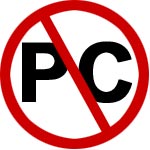Co-Authored by Dan Thornton and Matthew Thornton
Several years have passed, but I still remember the joy I found in naming my cow “Horse.” It was a little mischief I played on my young nephew Matthew, a special bit of humor you might say. Certainly, it was not an original idea. I think I most likely took my cue from the Viking’s naming of Iceland and Greenland, another obvious attempt at deception. It was many years later, after many re-tellings of the story, that I realized that I was using a harmless form of “Doublespeak.”
Have you ever wondered about the difference between the Secretary of War and the Secretary of Defense? What about terrorists and freedom fighters? Did you ever think that a preemptive strike seems more like an unprovoked attack? Why are some people unique while others are weird? And what is a substance abuse problem if not a drug addiction? Why do we refer to failing a grade as being held back? Are we just trying to be PC (politically correct)? Exactly what does it mean to be politically correct? If you look for synonyms in the dictionary, you’ll find a myriad of terms, such as: considerate, diplomatic, gender-free, inclusive, inoffensive, liberal, multi-cultural, sensitive, non-discriminatory, non-racist, non-sexist, bias-free, and respectful, to name a few.
[spacer height=”20px”]
George Orwell, who perhaps commented best on the subject in his novel Nineteen Eight-Four, developed what he referred to as Newspeak and Doublethink. Unfortunately, the Orwellian term, Newspeak, has come to carry a negative connotation because it is defined as the manipulation or switching of words to make an unpleasant, or otherwise negative situation, sound… not as awful. In contemporary news, we refer to this as spin. In particular, Orwell created the word Newspeak to describe the dangers of its use by governments to control the masses. In reality, political correctness is hardly different. It has acquired a cult status and is frequently used to suppress free speech, prevent meaningful discussion, and ultimately create hate crime laws. If it all sounds a bit Orwellian, it is. Political correctness is a coercive device used to punish nonbelievers, reward cultists, and ostracize anyone who questions the philosophy of the government as it attempts to achieve its goals. (As a quick reference, consider The Patriot Act, which allows the government to monitor – or secure – phone and computer records without a search warrant. A better term for this legislation might be The Loss of Privacy Act. Before political correctness was in vogue, it was crudely referred to as tyranny.
“I have appointed a Secretary of Semantics–a most important post. He is to furnish me with forty to fifty dollar words. Tell me how to say yes and no in the same sentence without a contradiction. He is to tell me the combination of words that will put me against inflation in San Francisco and for it in New York. He is to show me how to keep silent–and say everything. You can very well see how he can save me an immense amount of worry.” – Harry Truman
Let us consider a recent and particularly controversial example. In the summer of 2015, the Supreme Court decided that gay marriage was legal in all fifty states. Of the masses that the ruling did not directly affect, many could not have cared less to see the finalization of such an amendment. Certain religious groups, however, became very upset with the decision, and their point, as we shall see, is valid. In the wake of the Supreme Court ruling, a 2013 story resurfaced about an Oregon bakery whose owners refused to bake a cake for a gay wedding and suggested an alternative to the potential buyers. The would-be customers brought legal action, and the owners were forced to pay an exorbitant $135,000 fine that resulted in the closing of the bakery. Whether or not the bakers’ decision to turn away paying customers was a business-savvy or morally aligned move is debatable as a matter of opinion. Such debate, however, will not change the fact that from a legal and constitutional standpoint, the Supreme Court put the state in a position to forcibly negate and sacrifice religious rights in order to preserve gay rights.
More recently there have been cases where the courts have forced individuals to take sensitivity training in order to overcome their religious beliefs. Imagine a nation that boasts its freedom of religion and freedom of speech yet denies both and enforces the politically correct rights of another. How much more totalitarian can it get than to take a so-called progressive freedom such as that of gay rights and turn it into an inverse function that negates one of the nation’s oldest and most traditional freedoms? The bakery, previously referenced, would certainly be in the minority in Portland, Oregon, as most bakeries would not turn away perfectly good business under such circumstances. Why then was there the need for government intervention? Why not just allow the business owners to succeed or suffer the fate of their religious conviction? Is that not what freedom of religion entails? Perhaps the irony of the whole matter is that marriage itself is a Christian religious tradition that has nothing to do with the state. We may recall that it has always been referred to as holy matrimony.
“If people can’t control their own emotions, then they have to start trying to control other peoples’ behavior” – Robert Skinner
[spacer height=”20px”]
It might be meaningful at this point to examine the true meaning of political correctness in order to gain a full understanding of its underlying tyranny. First, the word political comes from the Greek word, politikos, and refers to the practice of influencing others. Children, in their earliest days of learning to speak, begin trials of informal politicking. From the first time they play mother against father to get an extra serving of ice-cream at dinner, they come to the understanding that they are able to manipulate the world around them and create the circumstances of their desire. In its most rudimentary form, then, politics is nothing more than a person’s attempt to get what he or she wants. What one person wants, however, could very easily result in the pain or loss of another. In our politically correct, highly evolved, ever-so-civilized world, people are not socially or legally granted the freedom to go out and seize whatever they wish to have without at least considering the perennial destruction that may be left in the wake of their otherwise self-centered campaign. Sound politicking, therefore, requires not only getting what you want but doing so, without looking like a bully. As such, political correctness is most accurately viewed as a style of semantics that can be manipulated and used with the intent of achieving the political agenda of a person or group. Moreover, we can deduce that being a cultist to politically correct language results from only one of two possible causes. Either users are trying to influence other people with their own political agenda, or they have been influenced by the political agenda of some person or group.
Like Newspeak and Doublethink, being politically correct is often, wittingly or not, used by governments as a deep-seeded technique for mind-control. Are there instances in which politically correct language might be used as a tool to further unite a people in freedom or equality? Maybe, and certainly there are cases in which people simply use politically correct language to be harmlessly polite. However, using political correctness as a common language cannot be forced upon people without infringing upon the guaranteed freedom of speech which is supposed to be judiciously protected. The truth of a person’s thoughts, after all, do not change just because he or she feels obligated to sugar-coat the way in which the thought is conveyed. To clarify, I am not referring to Orwell’s Doublethink here. Ultimately, being PC, in its best and most harmless form, is lying, and, in its worst form, is a medieval oppression of the mind.
John Cleese with Further Thoughts on Everyday PC:
PragerU: A Progressive’s Guide to Political Correctness




